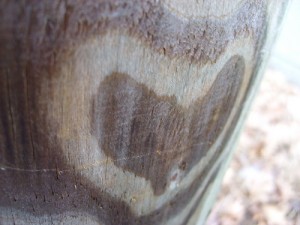 Ugh. By now, anyone paying attention knows about the plastic “soup” floating across the Pacific. You’re well-versed in the phthalates problem. You avoid bisphenol-A. You even try to avoid plastic overall as to lessen your consumption of petroleum.
Ugh. By now, anyone paying attention knows about the plastic “soup” floating across the Pacific. You’re well-versed in the phthalates problem. You avoid bisphenol-A. You even try to avoid plastic overall as to lessen your consumption of petroleum.
But what if that plastic water bottle wasn’t made of plastic anymore? Or even stainless steel? What if your “plastic” was actually made of wood?
For about 40 years, American scientists have been working on an alternative to plastic. But plastic is just so darn cheap and durable.
Lingin was thought to be the answer. It’s the byproduct of paper manufacturing, but currently, it’s burned as waste. However, this stuff is strong. It gives trees strength, and who wouldn’t want that? By using lingin, we’d be a reusin’. It’s also biodegradable.
Problem is, American scientists gave up on it over a decade ago. It simply couldn’t compete with that favorite in the States: cheap oil. Instead in the U.S., we’ve been working with that oh-so-abundant crop: corn. American chemists have also experimented with potato, wheat, and tapioca starches to something we’re all becoming familiar with. That is, biodegradeable water bottles, “plastic” silverware, produce bags.
But what about wood? This is primarily manufactured by German company Tecnaro. Their “liquid wood” can be molded and shaped and used like plastic, but biodegrades over time. Arboform is tough and durable lignin mixed with fiber from wood, flax, or hemp, as well as a few additives. Arboform starts as “pebbles” and ends with a “plastic” product.
Is it feasable? Here in the U.S., it’s simply cheaper to go for plastic, which may keep consumers away. For Arboform, it’s $1.60/lb in bulk versus less than a dollar a pound for polypropylene.
Not surprisingly, currently Arboform is not really available in the States. It’s sold to the European market, as well as in Australia, Brazil, and Colombia.
But with all the creepy chemicals in plastic currently, shouldn’t we look for as many substitutes as possible?
Source: ABC News.
Image: dmodzelewski on Flickr under a Creative Commons License.
The future is in alternatives to plastic, I think, and we may have to give up “cheap”. Great post! Super Eco is pointing to it: http://www.supereco.com/news/2009/02/20/plastic-replacement-made-from-liquid-wood/
Hemp is the ultimate fiber of the future, and can even be fertilized with the sludge from bio-gas plants that process humanure! The Canadian Government has legalized it, and will sell the fiber to the U.S.A. soon, if not already! SEE:
Last word on Hemp in Canada, Canadian government site for the truth!
http://www.nrc-cnrc.gc.ca/highlights/2008/0803hemp_e.html